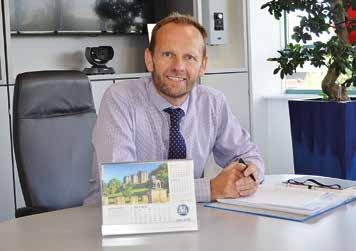
14 minute read
Buoyant BPW Reaches Another Milestone
BUOYANT BPW REACHES ANOTHER MILESTONE DESPITE BREXIT UNCERTAINTIES
Europe’s leading axle and suspension manufacturer, BPW Ltd, say that despite the forecasted economic doom around Brexit, the UK market has remained buoyant in 2018, with the company reaching another impressive milestone recently when its 200,000th axle rolled off the production line.
The company has also added a second shift at its facility in Leicester allowing it to further expand its assembly production, as Export & Freight has learned in an exclusive Question & Answer session with BPW’s Sales & Marketing Director Neill Groves. “Due to this increase in our assembly capacity, we are now able to assemble the vast majority of our market needs locally, giving us flexibility and agility in supplying a wide range of axle modules to our customers,” says Neil. And he adds: “By being able to offer our customers bespoke solutions according to their specific requirements, we have been able to keep their total cost of ownership to a minimum. Working in partnership with our customers to ensure they receive the right axle to suit their operational requirements, ultimately helps to keep their downtime to a minimum.”
So, how successful have the ECO Plus 3 hub and ECO Air COMPACT suspension systems been?
“The ECO hub system has been really well received. It is a robust system designed for high duty cycles and a long service-life and has sold over two million models worldwide. Since entering production in 2015, the latest generation of the ECO Hub, ECO Plus 3 has low maintenance features such as the hub puller unit, which follows the Formula 1 principle, enabling simple removal of the entire wheel and hub, including brake drum and bearings. Together with an integrated torque limiting hub puller nut, which emits a distinctive noise to let you know when you have reached the right torque, maintenance and servicing times are considerably reduced. “ECO Air COMPACT has been very successful since launching in the UK over three years ago. Suitable for both disc and drum, this suspension system has fewer components and the bolted modular design enables the replacement of individual running gear components for easy maintenance. A steel-rubber pivot bush helps even force absorption and stress distribution, for a smooth operation contributing to load stability, reduced tyre wear and driving comfort. This suspension, with its forged trailing arm, has now become a strong work horse for standard on-road applications.”
We understand you are developing two new electrical concepts. Tell us a little about those.
“BPW’s ePower and eTransport are two new electrical concepts for economical and low-emission transport developments. The electrification of axles offers a practical solution for electric power generation in the trailer. For
Neil Groves (Sales & Marketing Director).
companies looking for a sustainable approach to their transport solutions or who operate in low emission zones and congested city areas, these quiet, clean and low maintenance axles offer an ideal solution and address the needs of the 5.5 - 26 tonne segment. “eTransport, which heralds BPW’s re-entry into drive axle applications, was developed for distribution vehicles and can be integrated in a wide variety of vehicle models or retrofitted to existing fleets. With its’ capability for torque vectoring capability it enables greater manoeuvrability in an inner city environment with a drive which emission free and recovers braking energy. Charging takes a few hours and is sufficient for at least 1 day’s driving in an inner city goods distribution environment. “ePower is a system for energy recovery through trailer wheel hub generators, which are particularly suitable for supplying power to refrigerated vehicles. Just 1 axle equipped with 2 ePower wheel hubs generates enough energy during the braking process to operate the refrigerated box and reduces diesel consumption by @ 2,500 litres p/yr ePower is self-sufficient and can be mounted on existing axle designs.
What’s the take up been on your telematics system, Cargofleet 3?
“Idem Telematics, a member of the BPW group, leads the way with their ability to monitor a wide range of key vehicle operating criteria, such as tyre pressures, brake performance, loading times, temperature and load status and many more. This has given transport managers the ability to remotely monitor both the health of the fleet as well as the status of the logistics process, and trailer telematics is fast becoming a core tool for the management of transport logistics efficiency. “We have on our website customer testimonial from Gist who operate a predominantly temp controlled fleet of 2,580+ trailers. Gist’s engineering manager has incorporated our telematics system into their daily maintenance checks. “He tells us: ‘It has greatly improved the management and efficiency of Gist’s fleet maintenance. The system gives access to realtime data for an overview of the fleet’s status. Through the notification alerts, we have been able to capture problems both en route and prior to dispatch from the Gist sites, which has saved us breakdowns. The system has helped maintain Gist’s reputation as an extremely reliable supply chain operator, delivering goods not only in pristine condition, but in the smallest delivery windows in the industry. It has also reduced vehicle downtime and the risk of DVSA infringements for the business.’”
What importance do you place on Customer Service?
Customer service is an extremely important part of the customer journey and one which we strive to ensure is a wholly positive experience for our customers, whom we hope will become
Mark Pepper (Fleet Support & Training).
advocates for BPW. Our commitment to upholding the highest levels of quality across our brand extends to the technical support and training provided by our Customer Services department. This is a further testament to the long-term reliability of our products and sets us apart from the competition. We happily provide advice and work together to develop the best solution for our customers. As part of a fully integrated service, our experienced specialists provide a broad range of engineering services to support customers manufacturing operations. From application consultation to brake calculations, a total installation package can be delivered directly to the workshop floor.
We understand you regularly offer training for your customers, across the UK, including Ireland. Tell us what happens at such training events?
“To ensure that all BPW customers have access to this invaluable service, BPW’s prestigious mobile training and exhibition facility, Infomobil, tours Scotland, Northern England and Ireland to host a series of 1 day courses. These
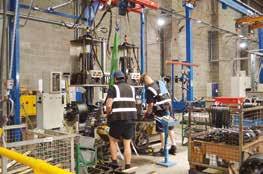
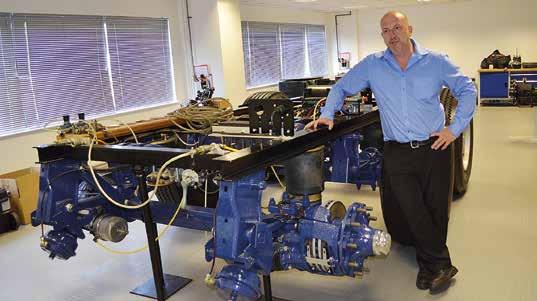
courses provide invaluable instruction in the maintenance and repair procedures for BPW running gear systems. During the day five modules are covered: ECO Hubs; ECO Drum Brake; ECO Disc Brake; Self Steer Axle; and Suspension Systems - Airlight 2 and SL.”
Still with customer service, tells us about ‘BPW ASSIST’
“Due to the large number of operators specifying BPW running gear, ‘BPW ASSIST’ was launched to offer a comprehensive and rapid breakdown service anywhere in Europe. Available around the clock operators can simply call the free 24 hour BPW Assist hotline for European wide breakdown recovery. To take advantage of this service operators can register with BPW for free membership to this scheme.” Recently you joined forces with Hidromas, one of the world’s leading manufacturers of hydraulic tipper components; how has that partnership been progressing? “The unique design of the Hidromas Gold Series makes their hydraulic cylinders one of the lightest and strongest in the world. Hidromas are also unique in hard chrome plating all stages as standard; this provides not only enhanced corrosion and scratch protection but also a superior smooth surface finish therefore allowing the use of harder seals which in turn wipe the stages of both oil on the exit stoke and most importantly prevent contamination of the oil, slipper rings and the seals by dirt and dust entering the cylinder on the return stroke. “The BPW product range offers premium products which focus on quality and reliability, and Hidromas is no exception. By nature, the tipper market is a very mature market with an established number of hydraulic suppliers offering the individual components. This is where Hidromas has an advantage, as not only is it a premium product which offers many operational benefits to fleets, but with Hidromas we are able to offer a complete package. The Hidromas package offers hydraulic cylinders, gear and piston pumps, control valves, PTOs and complete wet kits, such as corrosion resistant aluminium oil tanks, all of which can be applied to truck and trailers for side or 3-way tipping.”
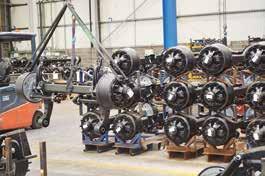
SUSTAINABLE ALTERNATIVES TO DIESEL POWERED TRANSPORT REFRIGERATION UNITS
With the world’s first Ultra-Low Emissions Zone (ULEZ) coming into operation in central London in the spring of next year the need for diesel alternatives to refrigerated transport has never been more pressing.
While Euro 6 diesel trucks may be clean enough to be exempt from any hefty charges being levied, those with a secondary diesel engine needed to power a delivery truck’s refrigeration unit may not be so fortunate sometime in the not too distant future. It is claimed that a diesel transport refrigeration unit (TRU) currently throws out six times as much nitrogen oxide and nearly 30 times as much particulate matter as a Euro 6 main engine. London’s ULEZ will affect estimated 60,000 vehicles a day, although not all being refrigerated trucks, and what’s more, other cities are lining up to follow London’s lead, including Leeds, Birmingham, Nottingham, Derby, Sheffield, Middlesbrough, Bath and Bristol. Closer to home, Belfast and Dublin could also be affected in the longer term. While Euro 6 trucks are the cleanest in the world and have greatly contributed to better air quality in major cities, the EU’s Non-Road Mobile Machinery Regulations has caused the spotlight to be turned on to TRUs which are regarded by some as being another source of pollution. Under the regulations, primarily aimed at cutting emissions from machinery used on construction sites and in the agricultural sector, a Transport Refrigeration Unit is also classed as ‘non-road’ even though it spends its time on the road while food deliveries are being made; the vast majority of these TRUs are powered by a diesel motor. So, what’s the solution to diesel? Many refrigerated transport operators are still of the opinion that none yet exist. The fact is Thermo King and its sister company Frigoblock have a range of options to cover all eventualities, as we have been finding out from Joe Grealy of Thermo King and Frigoblock.
Hybrid
Diesel and electric power, of course, each have their own advantages. By combining them, Thermo King and Frigoblock came up with the SLXi Hybrid to give operators the best of both worlds.
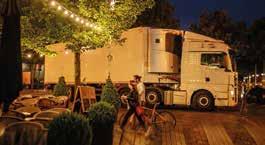
“For example, operators with a regional distribution centre outside London but who need to deliver into the city every day can run the TRU on diesel power before the truck reaches a low- or ultra-low emission zone when it can then be simply switched over to electric drive; indeed, thanks to geofencing, this happens automatically, with no driver action required,” explains Joe. The company also offers an alternator driven, all-electric, zero-emission system. “These are massively powerful compared to a standard TRU and are ideal for multi drop distribution. They have probably twice the cooling capacity, use 50% less energy and need significantly lower maintenance – and they are also much quieter.” Interestingly, this is not a new technology. Frigoblock have been offering it to customers for almost 30 years! Many blue-chip companies are already using it, so it is well tried and tested. It may be more expensive, but when you take into consideration Whole Life Costs, this all electric unit becomes more attractive. Savings on diesel alone can be quite substantial. With the introduction of ULEZs and the drive towards zero emission transport rapidly moving up a gear, we can see that this is a solution that will only gain in popularity.
CryoTech
Another sustainable solution from Thermo King is its CryoTech refrigeration units. “This is a tried and tested technology,” says Joe, “and it offers many benefits in existing markets such as Scandinavia and The Netherlands.” Thermo King’s cryogenic refrigeration units use liquid carbon dioxide to power a high-performance system that is ideally suited to urban distribution. Liquid CO2, which is recycled from industrial processes, is held in a refillable tank mounted under the vehicle chassis. When cooling is demanded by the microprocessor controller, valves open to allow the liquid to flow from the tank into the evaporator coils inside the cargo space. Electric fans circulate air through the coils. As the liquid evaporates, it cools the coil and the air passing over it. Cool air is thus circulated through the cargo maintaining the temperature set-point. Having cooled the coil and the air, the gas is directed outside the vehicle body into the atmosphere - it never enters the cargo space, unlike some other cryogenic systems which inject refrigerant gas into the load space creating potential safety hazards. “While you need an infrastructure to store and distribute the CO2, we do believe cryogenics has a potentially great future in the UK, not least because of its environmentally-friendly credentials and its silent operation.”
R-452A
Meanwhile, with HFC refrigerants being phased out, Thermo King were quick to develop a more sustainable alternative, R-452A. It has significant benefits over R-404A, which is one of the most widely used refrigerants, but has a high global warming potential. R-452A offers a 45% lower environmental impact and a lower operating cost; it also complies with upcoming 2020 F-GAS regulations and today is standard on all vans, trucks and trailer refrigeration units from Thermo King.

Extra seminars planned to keep up with demand for UK Customs roadshow
Businesses up and down the UK have been benefitting from a Customs roadshow, currently touring the country ahead of the introduction of the new Customs Declaration Service coming into force next month.
By Peter MacSwiney, Chairman, ASM
CDS will replace the current system, HM Revenue and Customs (HMRC)’s Customs Handling of Import and Export Freight (CHIEF), which has been in place since 1994. Hundreds of companies representing all trades have been attending the series, which are being run jointly by ASM, the British International Freight Association (BIFA), and HM Revenue and Customs (HMRC). The three organisations are offering businesses the support and guidance they need ahead of the phased introduction of CDS, which marks the biggest change to impact the processes by which Customs declarations are managed since the introduction of CHIEF. The roadshow has proven so popular that more seminars are now being planned for Heathrow, Southampton, and Felixstowe in the near future. CDS is an essential upgrade to cope with an expected increase in declarations post-Brexit, which will benefit the freight forwarding sector as it continues to modernise. The first phase of CDS is set to be implemented in August, followed by the second phase in November and it will be fully functioning by January 2019. The new system will allow HMRC to replace old technology and create a modern and more flexible service that will enable the better handling of both future changes and the increasing volumes of international trade. Alignment with the Union Customs Code (UCC) will enable the trade facilitations required by UK business today.
Rob Grayson (ASM (UK) Ltd), Ian Fraser (ASM (UK) Ltd), Shauneen McConville (TR Logistics Group), Simon Adams (ASM (UK) Ltd), Sharon Greer (ASM (UK) Ltd) & Carson McMullan (BIFA Northern Ireland Consultant).
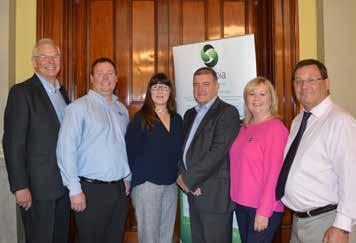
With Brexit taking place next year the changes are well timed for a UK logistics sector in a stage of significant transition. CDS will allow also us to tackle any fluctuations in declarations whilst at the same time being more compatible with today’s evolving trade landscape. Our sessions allow participants to fully understand and prepare for CDS, as well as giving them the chance to ask questions and relay any potential concerns. All the seminars that we have held to date, including Warrington, Pontefract, and Loughborough, have been oversubscribed, as are our future events in the coming weeks in Grays, London, Belfast, and Glasgow. The popularity of the seminars and the positive feedback we are receiving reflects how the industry is seriously considering the way in which the changes will impact business processes.











